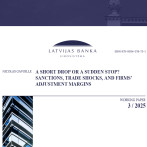Retail trade: a regular drop after a regular rise
One begins to get the impression that the strikingly precise rhythm of retail rises and falls will not be perturbed either by flows of tourists or spending the lats cash accruals or any other factors. The data for August published today are retaining the rhythm of fluctuations and, after a rise in July, we once again see a small drop: the retail turnover has contracted by 0.4% (month-on-month, seasonally adjusted data at constant prices).
The higher base for year-on-year rises has led to slowdown: compared to August of last year, trade has grown by a mere 2.1%, whereas at the beginning of the year, the rate was 2-3 times higher.
Albeit with a rhythm of fluctuation that is not so precise, similar upward- and downward-pointing changes have been observed also for Latvian consumer and trade confidence. However, in contrast to retail trade turnover (for which an overall upward trend is observed - rises are greater than drops), confidence indicators are fluctuating within a certain range that has not changed this year.
A completely different scene is observed in the rest of Europe where confidence indicators are showing a very rapid change for the better. Not so long ago, we surprised ourselves by becoming the most optimistic population and entrepreneurs in all of Europe and, along with Estonia and Lithuania, our stronghold of optimism seemed indestructible. However, following the very rapid improvement in the Economic Sentiment Indicator over the past few months in many countries, the total indicators for both the European Union and euro area, have almost caught up to the Latvian indicator.
While losing the title of champions of optimism may cause slight melancholy, the improvement in the European indicators is a much more important benefit, for it gives rise to hope for a stronger external demand. For two consecutive quarters, the main engine of Latvia's growth was private consumption, but sustainable development will have to depend on exports. If the Latvian exporters will make profit and create jobs, the purchasing power of families will improve. Thus a rise in sales volumes will be promoted by a rise in population income and not by reducing people's savings that are meagre to begin with.
Textual error
«… …»






